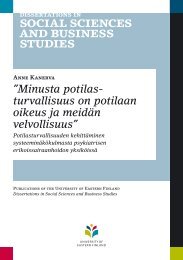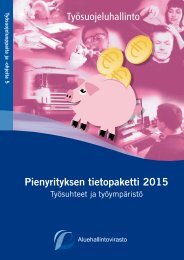urn_isbn_978-952-61-1770-6
urn_isbn_978-952-61-1770-6
urn_isbn_978-952-61-1770-6
- No tags were found...
You also want an ePaper? Increase the reach of your titles
YUMPU automatically turns print PDFs into web optimized ePapers that Google loves.
The first article (‘Fair and Balanced Positive Obligations – Do They Exist?’ 25 )asks whether the ECtHR takes the principle of proportionality into account whendetermining positive obligations. The burden imposed on the states would beunbearable if this principle was ignored. The argument is that the obligations imposedon the states must be fair and balanced in order for these obligations, andin fact the whole system, to be legitimate. Consequently, the imposition of disproportionateobligations on states eventually leads to the credibility of the entireConvention system being questioned. With regard to the ECtHR’s legitimacy, theprinciple of proportionality determines whether and to what extent positive obligationsexist, and whether the state has complied with them.The second article (‘“The Lack of Such a Common Approach” – ComparativeArgumentation by the European Court of Human Rights’ 26 ) analyses comparativeargumentation by the ECtHR, and asks whether it offers means of enhancingthe legitimacy of its judgments and, consequently, its legitimacy. Is any kind ofcomparative reasoning tool to enhance the legitimacy of the ECtHR?The third article (‘Should Social Rights Be Included in Interpretations of theConvention by the European Court of Human Rights?’ 27 ) analyses the argumentsconcerning the inclusion of social rights in the ECtHR’s interpretation of the provisionsof the Convention. The question is whether it is legitimate for the ECtHRto include social rights within the Convention when it is clear that the Conventiondoes not cover social rights. Will the ECtHR risk losing its legitimacy by interpretingthe Convention as including social rights?The fourth article (‘“…It is not its task to Act as a Court of Fourth Instance”– The Case of the European Court of Human Rights’ 28 ) focuses on the tensionsand problems involved in balancing the fourth instance doctrine against an expansiveapproach to the interpretation of the right to a fair trial (Article 6 of theConvention). This article has two aims. Firstly, it seeks to summarise the roleof the fourth instance doctrine in fair trial cases. Secondly, it includes a criticalevaluation of the justifiability of the fourth instance doctrine in such cases. Thearticle asks whether it is legitimate that the applications of a strict fourth instancedoctrine prevail over effective and dynamic interpretations of the fair trial provision.The legitimacy questions appear differently as between the fourth instancedoctrine and effective and dynamic interpretations points of view: the fourth instancedoctrine supports the formal legitimacy perspective, while the effectivenessof the fair trial provision is linked to substance legitimacy.25‘Fair and Balanced Positive Obligations – Do They Exist?’, 5 European Human Rights Law Review(2012), 538–550; hereinafter, this article will be referred to as the ‘positive obligations’ article.26‘”The Lack of Such a Common Approach” – Comparative Argumentation by the European Courtof Human Rights’ forthcoming in 23 Finnish Yearbook of International Law 2012-2013 (2015); hereinafter,this article will be referred to as the ‘comparative argumentation’ article.27‘Should Social Rights Be Included in Interpretations of the Convention by the European Court ofHuman Rights?’, 16:3 European Jo<strong>urn</strong>al of Social Security (2014), 252–276; hereinafter, this article will bereferred to as the ‘social rights’ article.28“‘… It is not its task to Act as a Court of Fourth Instance” – The Case of the European Court ofHuman Rights’, 7:2 European Jo<strong>urn</strong>al of Legal Studies (2015), 84–118; hereinafter, this article will be referredto as the ‘fourth instance’ article.17




